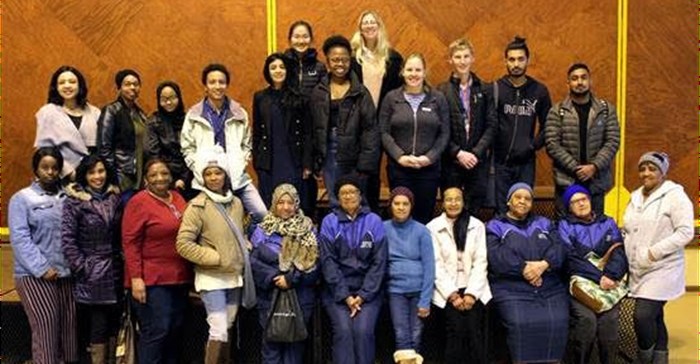
Subscribe & Follow
#AfricaMonth
In the news
First-aid training benefits community and UCT medical students

The group, including students Nabeelah Gani and Josh Fieggen, recently drew a wide range of participants when they conducted a day-long workshop in the Westridge Civic Centre.
“We met with the community members to find out what their concerns were. There were some common medical challenges, including asthma and epilepsy, and then trauma, because there’s a lot of violence in the community," says Fieggan.
The group then set to work on creating a programme for the workshop that focused on asthma, epilepsy, choking, burns, broken bones, bites and bleeding, while also touching on the subjects of advocacy and policy change.
A Mitchells Plain Community First Aid Facebook page was created to raise awareness about the upcoming event, posters were put up in clinics, and invitations were sent out by word of mouth.
Lifestyle diseases
“We had mostly community health workers and members of the Chronic Club, a group for people who suffer from lifestyle diseases, attending the workshop, but we also had some attendees who had found our Facebook page, along with members of a local gym and pre-school,” says Gani.
The workshop was a useful exercise to help attendees understand best practice in first aid, and to teach them some basic skills to ensure they don’t cause any further harm when helping someone in need.
The students also found that clearing up a few myths was probably the most rewarding part of the workshop. Many of the people who attended believed that when someone’s having a seizure, they should put something in their mouths – which is not the best idea.
To help people remember the skills they had learnt, the group created instructional flyers and handed them out on the day. The information has been added to the Facebook page as an additional resource.
Advocacy
Apart from teaching basic first-aid skills, the students also delivered a presentation about advocacy and policy change in healthcare, and how this relates to human rights. “They seemed quite keen to find out more about this. We hope that it might be taken up as a topic for educational talks at the local clinics,” says Fieggen.
“I think this block is incredibly useful, as it really helps us realise that we need to look at patients more holistically to really understand their context. This way, you can give them interventions that will be applicable to them in their specific situation,” says Gani.
The community responded positively to the project even requesting further first-aid education.










